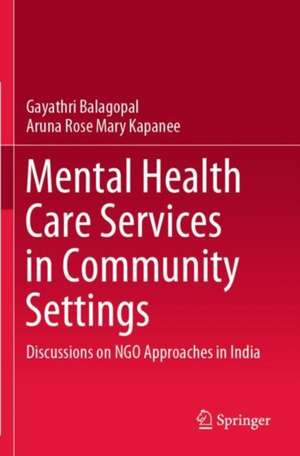Mental Health Care Services in Community Settings: Discussions on NGO Approaches in India
Autor Gayathri Balagopal, Aruna Rose Mary Kapaneeen Limba Engleză Paperback – 15 aug 2020
| Toate formatele și edițiile | Preț | Express |
|---|---|---|
| Paperback (1) | 359.79 lei 38-44 zile | |
| Springer Nature Singapore – 15 aug 2020 | 359.79 lei 38-44 zile | |
| Hardback (1) | 371.97 lei 38-44 zile | |
| Springer Nature Singapore – 25 iul 2019 | 371.97 lei 38-44 zile |
Preț: 359.79 lei
Nou
Puncte Express: 540
Preț estimativ în valută:
68.86€ • 71.13$ • 57.30£
68.86€ • 71.13$ • 57.30£
Carte tipărită la comandă
Livrare economică 22-28 martie
Preluare comenzi: 021 569.72.76
Specificații
ISBN-13: 9789811391033
ISBN-10: 9811391033
Pagini: 204
Ilustrații: XXII, 204 p. 29 illus., 20 illus. in color.
Dimensiuni: 155 x 235 mm
Ediția:1st ed. 2019
Editura: Springer Nature Singapore
Colecția Springer
Locul publicării:Singapore, Singapore
ISBN-10: 9811391033
Pagini: 204
Ilustrații: XXII, 204 p. 29 illus., 20 illus. in color.
Dimensiuni: 155 x 235 mm
Ediția:1st ed. 2019
Editura: Springer Nature Singapore
Colecția Springer
Locul publicării:Singapore, Singapore
Cuprins
Chapter 1: Mental Healthcare Services in the Community: Where Does India Stand?.- Chapter 2: How Janamanas Partners with Government and Women Self Help Groups to Embed Mental Health and Resilience in the Community.- Chapter 3: Integration of Mental Healthcare with General Healthcare Services for Tribals: The Decentralised Approach to Community Mental Health Programme by ASHWINI.- Chapter 4: Strategising Community Mental Health Service Provision for Underserved Areas and Resource-Poor Population: Satellite Clinics, and Care and Support Programme of Antara.- Chapter 5: Mental Health Service Provision and Enabling Agency among Clients, Caregivers: The Case of Rural Mental Health Programme of The Banyan.- Chapter 6: Altruism and Activating Neighbourhood Care for Persons with Mental Illness in the Community: Mental Health Programme of Mental Health Action Trust.- Chapter 7: Lessons Learnt on NGO Approaches to Mental Healthcare Provision in the Community.
Notă biografică
Gayathri Balagopal is an independent researcher based in Chennai whose work experience has been in the development sector as consultant with The Banyan Academy of Leadership in Mental Health, Health Portfolio of Navajbai Ratan Tata Trust and Madras Institute of Development Studies. She is co-editor of the book, Elderly Care in India: Societal and State Responses (2017) with Professor S. Irudaya Rajan. Her research has focussed attention on health and social care among the elderly, rehabilitation of homeless women with mental health issues, employment problems confronting persons with mental health issues, community mental health programmes and social protection in India. Her research interests are in public health, mental health, gerontology and social protection.
Aruna Rose Mary Kapanee is Associate Professor of Clinical Psychology, National Institute of Mental Health and Neuro Sciences (NIMHANS). She has worked at St. John’s Research Institute, Bengaluru and Karuna Trust, Bengaluru earlier. Her research has been published in leading peer-reviewed journals. She was one of the collaborators of the National Mental Health Survey of India 2015-16, which was published by NIMHANS. She has researched individual and family factors associated with psychological distress and well-being in young adults, rehabilitation and recovery in persons with mental illness, and community mental health programmes in India. Her research interests are in public mental health, creative and expressive arts in mental health, mental health rehabilitation and recovery, peace and conflict resolution.
Aruna Rose Mary Kapanee is Associate Professor of Clinical Psychology, National Institute of Mental Health and Neuro Sciences (NIMHANS). She has worked at St. John’s Research Institute, Bengaluru and Karuna Trust, Bengaluru earlier. Her research has been published in leading peer-reviewed journals. She was one of the collaborators of the National Mental Health Survey of India 2015-16, which was published by NIMHANS. She has researched individual and family factors associated with psychological distress and well-being in young adults, rehabilitation and recovery in persons with mental illness, and community mental health programmes in India. Her research interests are in public mental health, creative and expressive arts in mental health, mental health rehabilitation and recovery, peace and conflict resolution.
Textul de pe ultima copertă
This book discusses approaches used by NGOs in formulating and implementing mental health care in the community in the context of high treatment gap, insufficient public expenditure on health, human resource shortages, heterogeneity of communities as well as cultural beliefs in India. It uses a qualitative case study approach to document and analyse the work of some major NGO-run community mental health programmes in India, all of which cater to vulnerable populations and are in different and diverse regional settings. It casts the spotlight on envisioning community mental health in policy and law, implementation by the government, how it is practised by select NGOs and the challenges involved in programme implementation. In doing so, it hopes to understand the trigger factors that have led to NGOs embarking on community mental health programmes: how needs of the community are understood, the funding mechanisms, how the human resource gap was addressed, type of networks formedin the community, therapeutic and social interventions, accountability mechanisms, achievements and limitations of the programmes. This book is for students and researchers in the fields of social work and psychology, and NGOs, government and funding agencies, and for those interested in understanding and working with community mental health programmes.
Caracteristici
Provides key insights into community mental health care in low resource settings Includes important case studies and discussions on region-specific innovations and approaches Highlights role of community coalitions such as with caregivers, faith healers, local government institutions, youth clubs, volunteers, self-help groups as indispensable to community mental health care
